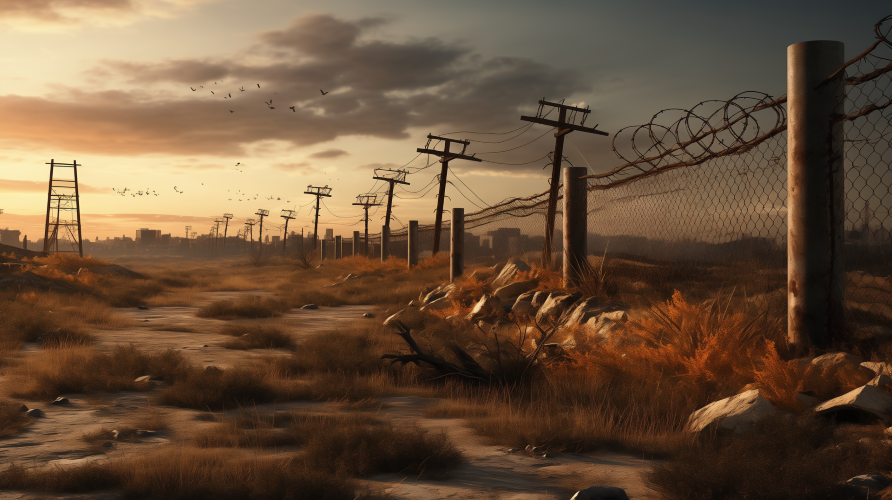In my previous context entry I have delved into a pure simulation game. In this entry however I will be focusing on something more akin to my project, a simulator working in tandem with the narrative elements, very old and extremly wrong in the UI departament – King of the Dragon Pass.
It is percieved as a genre-classic, or even a game classic but back in a day this game was a complete failure in its own category. My own experience in playing it makes me think that the cause was the UI itself and the heaviness of the gameplay.
(DISCLAIMER: I have played only a one-year demo of the game and may be not privy to how the whole game playes out)
In the game you are portraying a leader of a tribe that has settled on the Dragon Pass – a new, unknown territory that is said to be very dangerous. You are not the only tribe that attempts to tame the new land and you end up in a very crowded map. There is a very detailed prologue that tells the story of your tribe and establishes your patron god, etc, that lets you start with some sort of defining qualities to your clan. After the game starts, you are tasked with leading a tribe through years to come, balancing the defensive capabilities, farming and various other elements of a clan’s day-to-day, as well as resolving some narrative dilemmas that arise inside and outside your clan.
I have played the game recently and truth be told I have really liked the game’s idea – the game itself not so much. First of all I was told very little of what I should do. An enigmatic “survive” was thrown into the air and then all instructions have stopped. Other than that, the complex UI with many subpages and very vague writings or signs did not answer any of my questions. I have strived to decipher them but without any understanding I have limited myself to sending emissaries to other clans, asking for alliences.
The alliencies itself had a nice mechanic to them. All other triebs had a renome that needed to be matched while asking for a truce or an allience. Additionally you were expected to bring with you some sort of gift that was taken no matter what the result of the discussion was – effectively making it a high risk ask.
Another main mechanic of the game is the circle of advisors. They were named characters with backstories and their own ideals and gods that were gving you hints about all sorts of decisions. They were also the people that were leading the expeditions to other tribes. It was based on that, that some tribes refuse or welcome you more eagrely. The balancing of the emissaries vs the advisors who stay is crucial as the advisor who is away cannot give you his or her opinion on the dilemma.
So how it influences my design?
First of all, what I wan to take from King of the Dragon Pass is its story with consequences. In KotDP you make decisions that carry over through the game and influence further dilemmas and problems that you must face. It makes you take your time and really weigh the pros and cons of the decidsion – knowing that whatever comes out of it, will possibly bite you again.
Another thing I want to “steal” from the design of KotDP is their handling of characters. They are fleshed out even though they are not the main focus of the game. You are building a tribe alliences and resolving issues and you are using a circle of trusted advisors to do that – you pick and choose people that you want to advise you from a gathering of specialists from different fields, different backgrounds with different ideals and faith. It influences them and what they will say, what they will advise. One of my advisors was also once the center of the dilemma. Apparently he made fun of some person and it reflected badly on my rule. I needed to decide if I should get rid of that advisor. I did. It was amazing to see I can handicap myself in the game just by making some narrative choices. It really opened my mind into the realm of resource managemenet games and how they can actually capture our imagination. I felt really angry at this random advisor for making me look bad in front of others. It was an amazing experience of a sudden immersion in the game. I believe that if I had liked him before, the advisor, it would be a very difficult choice, wheter to let him go or risk some backlash of keeping him around.
To sum up, King of the Dragon Pass highlights for me several things:
– characters with deeper stories and background can be fitted into a management game
– the dilemmas/choices can be influencing the characters (if they are, the connection to them will grow, positive or negative)
– connection to the characters make different choices more important than others
– management heavy games should have intuitive UI (or it can hinder the experience immensly)
King of the Dragon Pass makes a very good example of making the characters feel important in the story. I believe you can get very much from mimicking and analysing the deeper mechanics in the game. The reviews of KotDP are prasing the intricacies of the gameplay and the immersion in the story of the world. The lore is rich and choices lets you explore different aspects of it. It was a worthwhile station in my design journey, but it is not a game I would be coming back to play.
